Have you ever found unwanted Google search results that shocked or alarmed you, such as an embarrassing or intimate photograph of you, leaked sensitive or inaccurate information, or other dissentious personal data or comments?
Yous are not lonely. In today'southward oversaturated online earth, there are plenty of opportunities for negative search results that may have a damaging effect on your business or reputation.
You can remove unwanted Google search results by:
- Reviewing and adjusting your websites and social media profiles' privacy settings
- Using opt-out policies on websites that display or collect your information
- Updating your (or your business organization'southward) sensitive information in Google's Knowledge Graph
- Asking a website to remove content
- Engaging in online reputation management
In this post, nosotros will take a closer await at how search engines prioritize and return results, what kinds of results search engines will generally remove, and how to get unwanted search results taken down. By the end of this article, you should have a articulate understanding of how to protect your (or your business organization'due south) reputation online.
Reasons to Remove Unwanted Google Search Results
The net is a large place. You might wonder why it is worth your time to try getting negative search results removed when it feels like searching for a needle in an exponentially-growing haystack.
Notwithstanding, monitoring and maintaining your digital footprint has become a necessity for businesses and individuals alike. While a positive online review or online presence can work wonders for your reputation, negative and damaging search results tin can dismantle it just equally rapidly.
For instance, unwanted search results can:
- Harm your personal reputation and relationships;
- Harm your business concern or professional reputation;
- Cause stress and be emotionally taxing to you personally;
- Cost you a great deal of money (either by losing customers or employment).
Why You Might Want to Remove and Push Downwardly Negative Search Results
Monitoring and curating your online reputation is important, but there are other more specific reasons you lot may want to remove or push down negative results likewise.
Keep in mind that the starting time folio of search results is what people run across and know of you.
The net may contain dozens of web pages listing your many accomplishments or glowing reviews for your business – only if those pages are cached below inaccurate or negative search results, the average Google user will likely never notice the positive content.
If an incorrect or negative result appears on the beginning page, that event in itself can take a damaging upshot on your reputation. But across its individual effects, the fact that it is taking up space on your first folio ways that there is less room for more than authentic, updated, and favorable results.
If you prefer Google to prioritize the most important or relevant content about yourself or your business, your best option may be to remove the negative search results that are crowding out other content.
Whatever your reason for removing or pushing downwardly negative search results, the following 2 sections provide assistance for people who are looking to remove outdated or unwanted data from Google.
How Do You Remove Your Name From the Google Search Engine Completely?
Unfortunately, it is non possible to remove your name completely from Google's search engine. However, at that place are a few best practices to go along in heed when trying to remove data that can be taken down and protecting your digital privacy:
- Embrace the fact that more and more data, especially publicly bachelor information, is being posted and stored online;
- Practice information control. Post and promote but the information that you are comfortable with the earth seeing, and do your all-time to take down everything that is private;
- Engage in online reputation direction and the suppression of information you lot do not want to announced on the kickoff page;
- Delete and conciliate unneeded accounts;
- Ready your social media and other accounts to individual (or adapt the privacy settings);
- Remove yourself or opt-out from information broker sites like MyLife.com;
- Remove your personal information from websites you control and from your websites' Whois information.
Online Reputation Management & Monitoring Tip: Nosotros recommend creating a free Google Alerts account to monitor your online reputation and the internet for specific keywords. Simply enter your proper noun and the target keywords you want to monitor, how frequently y'all want to receive notifications, and create a Google Alert. Y'all will and then receive a Google Warning someday your inputted keywords are mentioned anywhere online.
Types of Google Search Results That You lot Should Remove
While there are sure search results that y'all tin can (and should) remove, it is an unfortunate fact that not every unwanted search event can be removed hands.
The first affair to sympathise is that, when it comes to getting content removed, a website is non the same thing as a Google search consequence.
Google is but a search engine, after all. The data in Google search results is always crawled and aggregated from some other source.
Individual search results tin exist selectively blocked by a search engine, simply content and websites that appear in search results volition still be if non removed at the source. Successfully requesting that Google end showing content on its search results will not delete the original web page or change the content that it contains.
This is why you cannot simply "remove your name" from Google. For example, your name may not be unique. Also, Google only brings up search results from other sources (web pages). Then if sure web pages contain your name, Google will non remove your proper name from those sources, because information technology does not control them.
The best strategy is to remove your information directly from those spider web pages (using the steps we will discuss later), and then inquire Google to remove that outdated content from search results.
How Do Search Engines Ensure That You Get Relevant Results When You Type a Query into the Search Bar?
When you search Google, you are not searching the spider web — you are searching Google's index of the web. Recall of Google as a librarian using an index or bill of fare itemize organization to find books on the topic you are request about, except it only takes Google a split second to search the "library."
Google conducts this lightning-fast search by doing a bang-up bargain of piece of work ahead of time. It sends out web-crawlers (or "spiders") to crawl websites and larn information pathways. Google uses the information gathered by its crawlers to create an index based on signals (like keywords, the popularity of the content, and the "freshness" of the website).
Google uses its index and constant re-crawling to create circuitous and interconnected strings of data that answer your questions based on the content of other sites.
When you search for a term (say, "pizza near me"), Google uses its search algorithms to provide what it sees every bit the most relevant results.
Google'southward algorithms rank results based on diverse factors in its quality rater guidelines:
- The presence of the keyword on the web folio
- The quality of that page's content and how popular that website already is with other users
- How "usable" that website is (for instance, if it is responsive on mobile devices or loads quickly)
- Your context (like your location and search history). In our pizza example, Google would prioritize pizza restaurants within a few miles of your location.
Many people think that Google is deliberately showing things in their results, but this is but not the instance. Google does not dispense its rankings or individually curate how sure results are shown for certain keywords.
Your search results are the issue of artificial intelligence (AI) constantly running updates, making tiny changes, and assessing countless factors at in one case.
What Type of Websites Can Yous Remove Your Data & Content From to Improve Your Online Reputation
While you cannot command every web page that contains your data, you still take several options to remove unwanted search results and ensure that your digital footprint is as positive as possible.
i. Remove Information From Websites That You Own
If yous are the direct owner of a domain, y'all have a say in the content. If yous have a blog through WordPress, Wix, or Blogger, for instance, you tin can make sure the information independent on that site is authentic and in line with your brand.
2. Accept Control of What Your Social Media Profiles Say Nearly Yous
You also have a direct say in the information contained in your Facebook, Twitter, Snapchat, or TikTok profiles. Make sure to fix your profiles to private; otherwise, the post-obit types of data may be available to the public:
- Full proper name, age, gender, and marital status,
- Contact information,
- Professional or educational history,
- Family members and connections,
- Photos of yous.
Then, make sure every post or piece of information on your social profiles is something you lot feel comfortable being generally available on the spider web. Rummage your profile to remove whatever posts, comments, pictures, or personal information that you lot would non want to appear on Google search results.
iii. Remove Old Youtube Videos & Pictures
If you posted content to YouTube in the past, it is in your power to remove that content so that it does non appear in search results.
If you would like to go on that content online, you may also be able to change the privacy settings for your aqueduct. YouTube allows most channel owners to choose where their videos can appear (and who can watch them).
4. Delete Comments on Public Forums & Posts
If y'all signed up for a forum business relationship five years ago and got into a heated argument with another user, that thread is still floating effectually online.
While you probably cannot delete the thread, it is a good idea to log into your account and change your username to something anonymous (user12345), so lock or delete your business relationship. That way, those sometime comments will non be traceable to you.
five. Opt-Out & Remove Personal Data From People-Search Sites & Other Data Banker Websites
Data banker sites collect your personal data and resell it to other companies. Some information brokers take the form of people-search sites that allow internet users to find data almost other people with basic starting information.
Video: Want to Remove Yourself From Information Broker Websites? Find Out How

Watch
Other data brokers sell individuals' information to businesses looking to market place their services to targeted audiences. And other data banker sites assemble individuals' information for use in risk mitigation services that are used to verify personal data and prevent fraud (for example, asking you to confirm a street yous used to live on when applying for a loan).
If yous can, it is a good idea to opt-out of inclusion in data broker sites such as these. See our main list of data broker sites that you can contact to remove yourself from their databases — or you can ever hire an online content removal attorney to help you.
What Types of Websites & Content That You Do Not Command That Announced in Search Results Tin You lot Remove?
While you can control a few ways that data about you is found online, in that location are several sources of information that you have no control over, including:
- Blogs or websites that include content about y'all,
- An article about you on a news site or Wikipedia,
- Websites or social media sites that utilize your artwork or photos,
- Pinterest pins that include a photograph of you or a photo you took,
- Other people's social media profiles or posts that include information about you.
Whatsoever website that you do not take command over may display your information, including shaming websites, scraper sites, old news articles, and social media posts. If a web page'southward content is harmful to your reputation, you (or your attorney) will need to accomplish out to the website administrators or webmasters to have them remove this content.

The Most Common Types of Search Results That Google Removes
While in most cases your best strategy is to approach the owner of the offending website earlier going to Google, there are exceptions. Nether sure conditions, search engines similar Google are amusing to removing some types of content, if that content violates their Terms of Service (ToS).
Google is commonly willing to remove the following types of content:
- Revenge porn and intimate images,
- Involuntary imitation pornography,
- Content most y'all on sites with exploitative removal practices,
- Select financial, medical, and national ID data,
- Doxxing content,
- Content that falls into specific legal situations.
If that is the case, employ this asking form to make Google aware of the problem.
Withal, continue in mind that if Google does take activity, they can only remove the content from their search results. That content is however present on the original web page (and on Bing and other search engines), which is why you will need to take further action to remove the content from the internet completely.
Revenge Porn & Intimate Images
'Revenge porn' is the distribution of sexually graphic or explicit content of individuals without their consent. Individuals seeking to harass or shame their victim may publish intimate images to various platforms including social media websites, forums like Reddit, or fifty-fifty revenge porn websites.
If the unwanted search results in question involve revenge porn, Google will consider a content removal request.
Involuntary Fake Pornography
If someone created and published a simulated image or video (such as a deep fake) depicting you in a pornographic manner, Google may remove that media from its search results. According to Google'south guidelines, the cloth must run into the following requirements in order to be considered:
- Y'all are identifiably depicted in the imagery;
- The imagery in question is false and falsely depicts you nude or in a sexually explicit situation;
- The imagery was distributed without your consent.
Content About You on Sites With Exploitative Removal Practices
Some sites will post sensitive or dissentious content about you in order to charge you a fee for its removal. Google stipulates that this type of content is divers by the following:
- Yous are the discipline of the content in the submitted URL,
- The website is not a business concern review site, and
- The website has removal practices that necessitate payment to have the content removed.
If the content in question meets the higher up criteria, Google will likely remove it.
Select Fiscal, Medical, & National ID Information
If your personal information has been shared on someone else's site that creates a run a risk of identity theft or financial fraud to you lot, Google will remove that data. They will only consider the following information for removal:
- National identification numbers (such as a U.S. Social Security Number),
- Banking company account or credit menu numbers,
- Images of signatures,
- Personal medical records.
Doxxing Content
Sometimes, malicious individuals may share their victim's personal information online in an attempt to shame or harass them. This invasion of privacy is called doxxing (or "doxing") and is a form of online shaming. Doxxing can have very dangerous consequences for its victims, so Google takes it very seriously.
If the contact that concerns you contains your contact data and either implicit or explicit threats OR a call for others to harass you, Google should honor your request as long as the information is non determined to be "of public involvement."
Other Content & Information That Google Will Remove from Unwanted Search Results
Google also removes content that violates legal orders or specific copyright and privacy laws, such as:
- DMCA copyright violation reports: If the content violates copyright, Google will remove those search results per a DMCA takedown discover. Each time Google receives a copyright takedown notice, it is sent to and appears in the Lumen database of legal complaints. A link volition also appear at the bottom of the search results on Google.
- Kid pornography and abuse imagery: Visual depictions of sexually explicit comport involving a modest are illegal and are not tolerated by Google or whatever search engines.
- Spam, paid links, or malware: Google does not take straight action confronting violations, but spam or malicious search results may notwithstanding be taken downward. Run into Google's guidelines on reporting spam, paid links, and malware to report this kind of content.
- Court order: If a court has ruled that certain content is unlawful, Google will remove its search results.
- Regime requests to remove content: A government may ask Google to remove certain search results because the content violates local constabulary.
- European privacy law: The Right to Be Forgotten is a privacy police in the Eu that enables individuals to ask search engines, such as Google, to remove certain results that include their name.
If your content falls into one of these categories, Google'southward legal troubleshooter form to request the removal of content for legal reasons.
Revenge Porn Removal Tip: If someone is distributing your images without consent , the top iii ways to go the images removed from the internet are to (1) transport a DMCA takedown notice, (two) written report the intimate or explicit image to the hosting platform and/or search engines, or (iii) hire a content removal professional or revenge porn lawyer.
four Steps to Take to Remove Unwanted Google Search Results
Once you make up one's mind it is time to remove damaging content from Google, your first step should be to Google yourself brand a full assessment of your Google search results. Then, compile a list of the results that you will work to remove.
But so the difficult question arises: How exercise you decide which unwanted search results to remove first?
i. Remove Content That You Do Control
Go later on the low-hanging fruit first. Start past removing the content that is located on sites you lot control, including your:
- Websites
- Blogs
- Social media accounts
- YouTube channel
- Comments on public forums
Simply log in to each site and delete the content. For instance, on Facebook, simply navigate to a mail on your timeline. Select the three dots on the upper right corner of the post, then click "Move to trash."
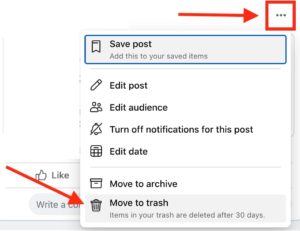
Then adjust that website's privacy settings. For example, on Facebook, click the down arrow at the meridian correct corner of your home feed. Select "Settings & Privacy," and then "Settings."
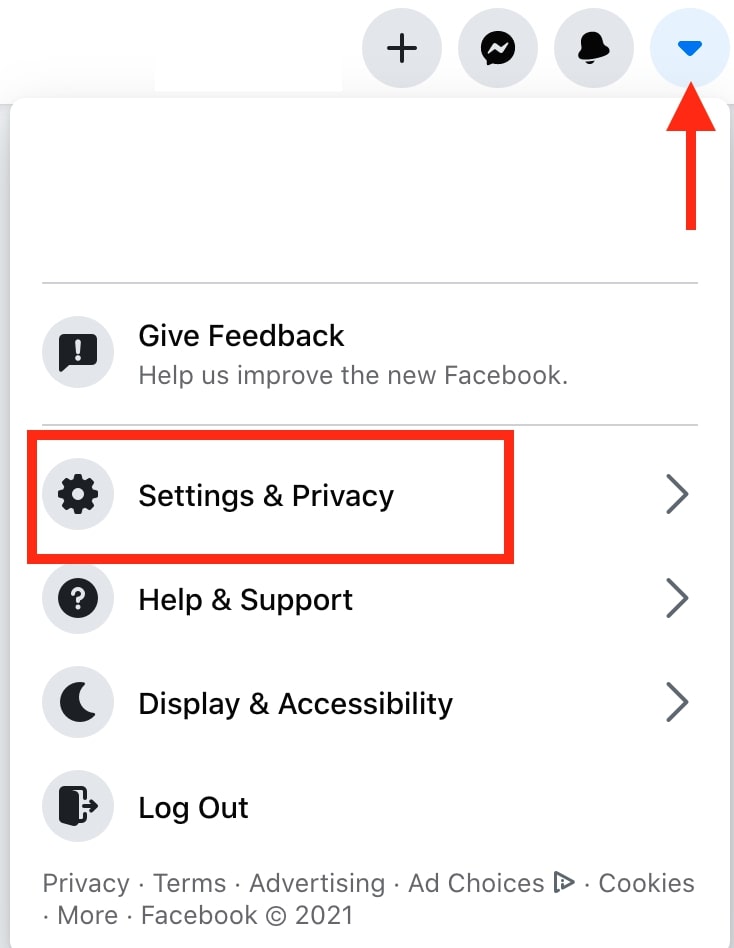
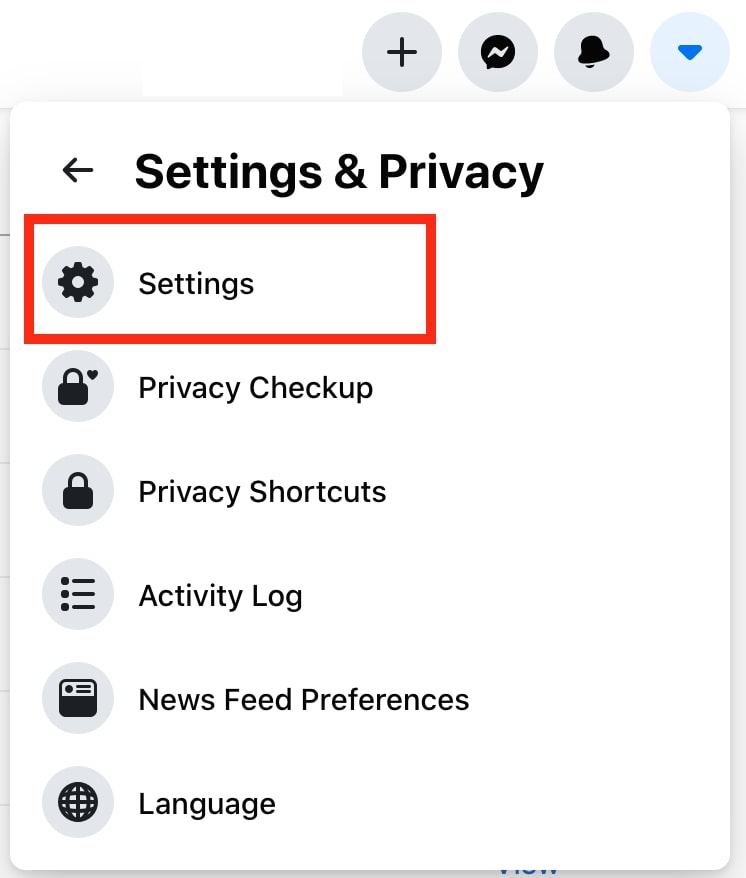
On the Settings page, click the "Privacy" option. On this page, y'all tin can choose who tin see your posts, how people tin find and contact you, and whether search engines can link to your Facebook profile.
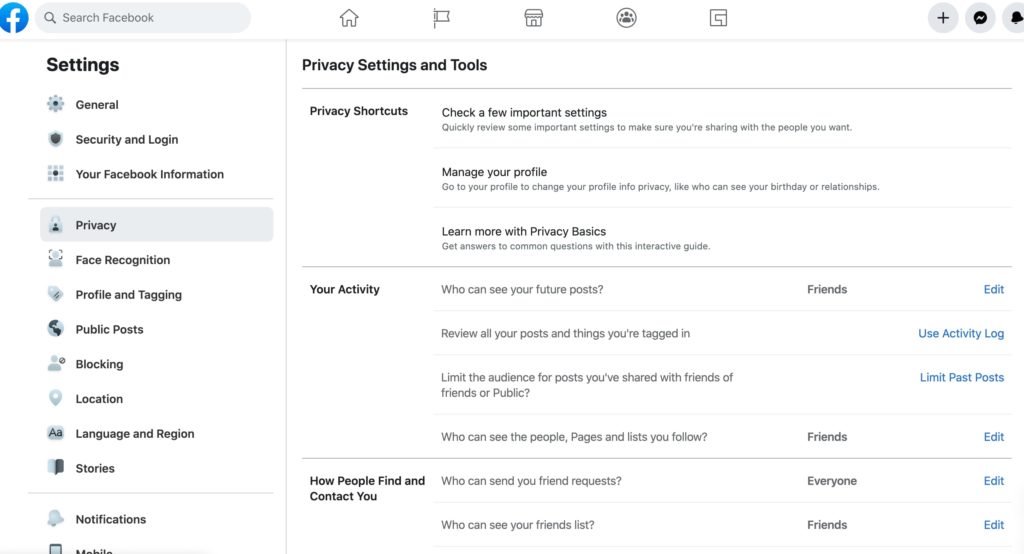
Starting with what you can control will help you lot build momentum. Early success in removing unwanted data will help you later when you lot arroyo sources that you do not control.
Not only will it give you more confidence, but if a source sees that they are not the only ones that take the information published, they are less likely to agree to accept it down.
ii. Remove Content From Sites That Are Easy to Piece of work With
Next, attempt to remove information from sites that have very clearly stated, easy-to-follow opt-out policies. Again, build that momentum past starting with simple tasks.
Sites that you lot do not command but may exist easy to piece of work with include:
- Data banker sites
- People-search sites
- Blogs or websites that include content about you
- An article about you on a news site or Wikipedia
- Websites or social media sites that use your artwork or photos
To remove harmful content from sites that yous practise not own, bank check the website for a published opt-out process. If in that location is not one, look for a "Contact U.s." link and use that to constitute a dialogue.
If there is non an easy way to arrive touch with the site, see Step iv below.
iii. Remove or Update Information From Google'southward Knowledge Graph
Google's algorithm is much more advanced than simply pulling results based on keyword frequency. The visitor has developed a Noesis Graph, which is a database of facts gathered from diverse online sources to help the AI interpret your Google search intelligently and deliver the information you are looking for.
And so, what if that Noesis Graph is storing unwanted or inaccurate information well-nigh y'all?
You volition need to remove or update that information by updating a Google knowledge panel. To do this, sign in to the Google account that is associated with you or the business y'all correspond. Then, simply search for your entity and click "Suggest an edit" in the knowledge panel on the correct side of the results page.
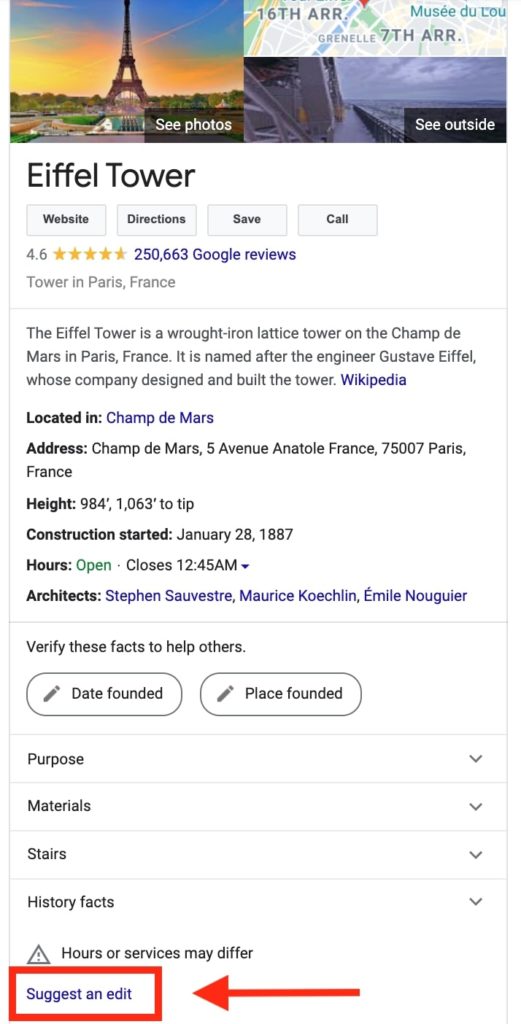
Changing this information will assist prevent your search results from reflecting that inaccurate data.
4. Asking Removal From Sites & Content You lot Do Non Control
Finally, go to the sites that y'all practise not command and ask for the removal of unwanted data. This footstep is by far the hardest, and so exist certain to tackle it last. Hopefully, at this point, you will be familiar with website policies and terms because you lot removed easier items first.
Due to the permanence of cyberspace content, many publications will now consider removing outdated or incorrect negative news manufactures that could harm their subject's reputation. For example, you may succeed in convincing newspapers, online news sites, student publications, and websites to remove damaging or unwanted content about y'all from their platforms.
To ask for removal from sites, follow these steps:
- Look for a style to contact the owner of the website (check for a "Contact The states" form);
- Use the Whois directory to contact the site'southward hosting visitor to ask to exist put in touch with the website possessor;
- Equally a last consequence, become to Google and ask that those search results be removed.
What Should You Do if the Search Results Are Correct, Merely the Cached Pages Still Provide Outdated Information?
To assistance users cull which search upshot to click, Google oftentimes provides a "snippet" of relevant summary information drawn from each webpage that appears on the search results. For instance, if you are searching for information on the Eiffel Tower, Google will aggregate information from the Wikipedia article to display below its page title on the search results page.

Even so, Google search results can sometimes show outdated information in this summary snippet. What happens when you correct the data on the page itself, merely Google is nevertheless showing that incorrect information in the search results description?
This problem is quite mutual. If the content is no longer present on a spider web folio, information technology is important to remember that information technology will come out of search results eventually — when search engines re-crawl these pages and realize that the content is gone. However, this process tin can take anywhere from a few days to a few months.
Many people effort to speed up the procedure by notifying the search engines that the information is missing immediately so that the search engines volition accept action right away. This process is called outdated page removal.
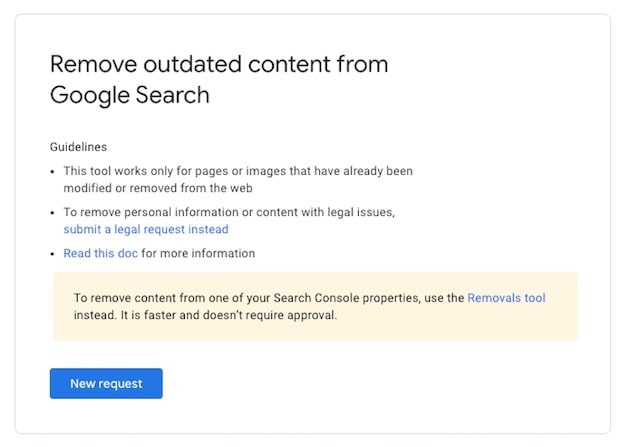
To begin this process, navigate to Google's request page for outdated folio removal (note that yous need to exist logged in with a Google business relationship to utilize this tool).
- Click "New Asking" to first a fresh request class;
- Enter the address of the web page in question (annotation that it is of import to remove the verbal URL that is appearing in search results, NOT the URL copied from the URL bar in your browser when you are on the spider web folio);
- Click "Submit".
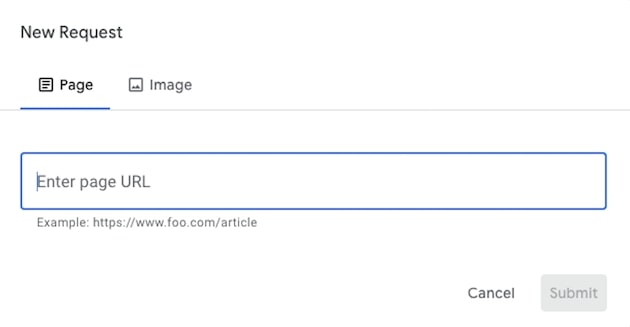
In some cases, you may need to clear Google'south search results cache for that item.
A cached folio is a web page that has been saved on Google's (or another search engine'south) servers. Search engines and browsers cache pages so that they tin can access them more quickly or when the originating server is not accessible.
While caching helps speed up the internet search process, it can cause a delay when trying to update Google search results. This is considering Google's search results are not always based on the up-to-appointment versions of each web page each time it runs a search; some results are drawn from cached versions of those webpages.
If y'all demand to clear Google'due south search results cache for a webpage that has recently been updated, start by following the steps above. Yous will receive a prompt stating that the image or site you are trying to remove has not been removed by the site possessor. The prompt will ask if the paradigm or site has been removed or updated.
Follow the prompts to indicate that the snippet and cache are outdated on Google's search results, then provide any information you can on what has changed (your proper name, contact data, etc.). That information has "changed" because it is no longer on the page anymore; information technology does non need to have changed in real life.
Once yous submit a request to Google, they commonly remove the content at issue within 24–48 hours. The status of your removal will appear in the window below, titled "Removal Requests." You tin can monitor the request from this folio.
What Should You Practice if the Webmaster Refuses to Remove the Unwanted Content?
Non everyone is successful in convincing other website owners to remove negative content almost them.
At that place are a few tactics you can employ when webmasters pass up to cooperate — but the most important affair to remember is that you should be patient. Attitudes modify over time, so if you neglect to go that content removed or suppressed, yous tin can always try over again later.
one. Pursue Legal Remedies to Remove the Unwanted Content
If a website or search engine refuses to cooperate in removing damaging content, you may need to employ legal channels such as filing a lawsuit and obtaining a court club to remove content from the internet.
It is e'er a good thought to engage an experienced content removal attorney who will be able to determine whether the content in question gives rising to an actionable legal claim.
The methods to employ in removing content depend profoundly on the type of content at issue. For example, removing news articles is unlike than removing fake Google reviews or revenge porn.
At Minc Law, nosotros have helped remove hundreds of thousands of pieces of dissentious content for our clients over the years – and we can help y'all decide which course of activity is right for your state of affairs.
2. Engage in Suppression of the Negative Content
Many online reputation direction professionals also utilize reverse SEO to engage in the suppression of negative content. Reverse SEO is what it sounds like. While traditional SEO (search engine optimization) focuses on making content optimized for ranking as high as possible in Google results, contrary SEO does everything possible to coffin the target results every bit far down every bit possible.
Reverse SEO is washed past creating good content and optimizing it to rank college than the unwanted content. You might:
- Commencement a blog and focus on building traffic;
- Follow SEO best practices on all your visitor'southward existing web pages;
- Create or be more than agile on social media profiles;
- Invitee post on other blogs with links linking back to your own blog or website;
- Create a podcast, start a YouTube aqueduct, or start another content marketing strategy.
Of grade, you may not accept the fourth dimension to create enough positive content to bury your negative search results on your ain. Another excellent course of action is to partner with professional online reputation management services to help you.
Minc Police force Reputation Management Tip: If you need to suppress negative search results, one unproblematic tactic is to create social media accounts. When someone searches your proper name, your social media accounts will be the outset results that announced. You can also write articles or even cocky-publish books that help you plant leadership within your industry.
We Can Aid Yous Remove Unwanted Search Results
The internet is a listen-bogglingly vast, complex network of unique web pages that are all controlled by different entities. It is most inevitable that you lot will eventually find unwanted search results pertaining to you.
While it can feel incredibly overwhelming to find damaging content almost yourself online, in that location are steps you can take to become that content removed (or at least taken off of the search engine'southward search results).
★★★★★
"I contracted Minc Police force for the removal of a defamatory posting tied to my phone number and outset name, and its removal from major search engines. Everybody I came into contact with at the firm was friendly, professional and attentive throughout the process. Dayra Lomba was assigned my instance and she did a great job – she answered all of my questions thoroughly and honestly throughout, and responded to my electronic mail inquiries in a prompt and timely mode. The removal piece of work was completed within the fourth dimension frame that was promised and I was very pleased with the results. I highly recommend Minc Law and Dayra Lomba for this type of service, and if their work on this is any indication, I'yard sure they would be neat for whatever other services they offer."
-TD, Oct 3, 2019
At Minc Law, nosotros take all-encompassing experience removing dissentious and defamatory net content. Contact us today to schedule your free, initial no-obligation consultation past calling us at (216) 373-7706, filling out our contact class, or speaking with a chat representative.
Source: https://www.minclaw.com/how-to-remove-search-results-from-google/